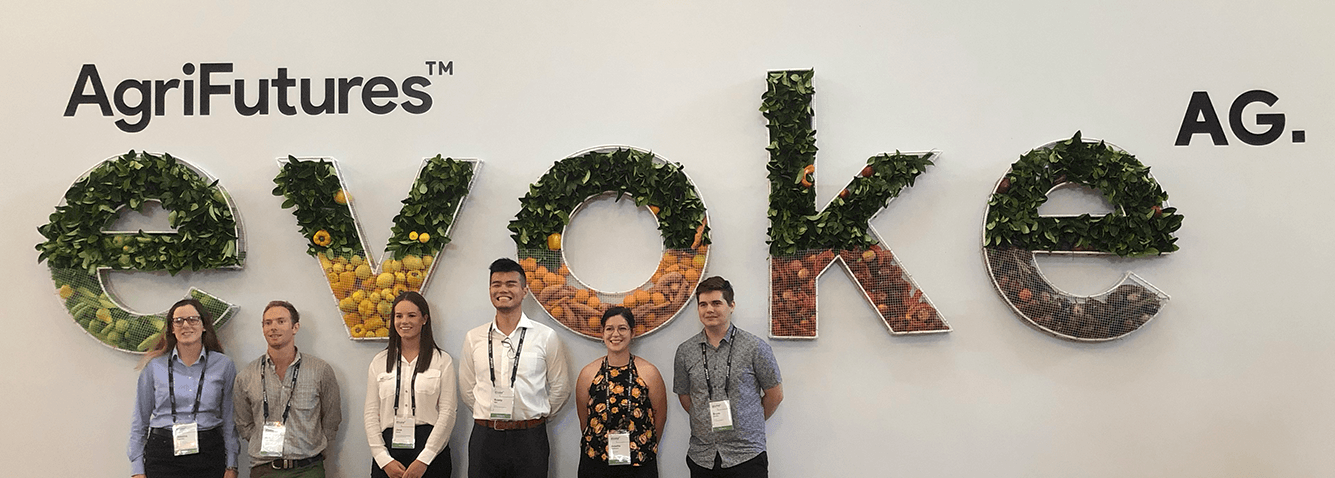Tickets sold out to evokeAG 2020, held in Melbourne and the biggest agri-food tech event in the Asia Pacific region. Well over 1000 delegates came together to discuss how innovation and technology can help solve the biggest challenges in agriculture, both in Australia and globally.
Speakers included John Hartnett of SVG Ventures and THRIVE, Frank Terhorst from Bayer, and Jack Cowin, owner of Hungry Jacks. Subjects ranged from plant-based proteins as alternatives to meat, to the use of artificial intelligence in farming.
As a silver partner of evokeAG, we sponsored six Emerging Leaders from across Australia to attend evokeAG and a Future Young Leaders evening hosted by AgriFutures Australia.
Our Emerging Leaders shared these reflections.
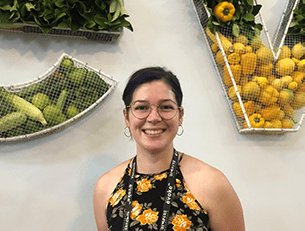
Flash forward
Walking into the Royal Exhibition Building in Melbourne on Tuesday, it really hit me how huge agri-technology has become. I was 14 years old when I started my journey in agriculture. The most advanced agri-tech I knew about was electric fences, and the “magic wand” and weigh scales used on our school farm. That’s not to say more sophisticated technology didn’t exist then, it just wasn’t widely used by mainstream farmers.
Flash forward to February 2020, and producers can measure the soil moisture at any given place on their property from their smartphone; there’s an app that is used to record inputs and outputs, has weather forecasts and stock trading price estimates for the following days; meat that is made from plants; solar-powered robots to locate and target-spray weeds; drones to muster sheep in locations inaccessible to humans; and GPS collars to monitor grazing, rumination and land use of dairy cattle.
The value of investment in agri-tech isn’t limited to farmers. Governments, researchers, private companies, start-up foundations, schools, data analysts, consumers and many more all contribute to, and have a stake in the development of agri-tech.
Our food and fibres come from farmers, and we need them to succeed if future generations are to have food security. This, and the increasing demand for high quality, low cost products drives farmers to find ways to use technology to their advantage.
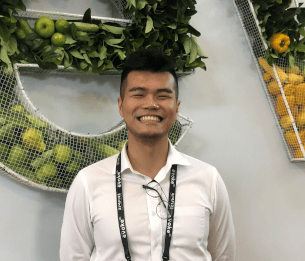
International markets
By Bobby Wen
The evokeAG 2020 event completely changed my understanding of the agriculture industry. Growing up in suburban Melbourne, farms and agriculture have always seemed distant and unrelated to me. However, I’ve always had a passion for food, for Australian produce and for connecting people with the food they eat daily.
At the conference, I gained a comprehensive overview of the agriculture industry, exciting developments in the agri-tech space, and connected with people I never thought I could. For example, I met a start-up founder who wanted to promote the growth of high-value, Australian-grown seaweed in local and international markets, an idea I found incredibly compelling.
There was also a lot of value in connecting with other young people in the agriculture space, such as the AgriFutures Young Leaders. Being able to share our ideas on how to shape the industry for the future inspired me to think more broadly in my pursuit of solutions to agricultural issues.
The workshops were equally incredible, with one providing in-depth insights into market expansion and engagement with Asia, which is an area I am particularly passionate about.
With the new connections, ideas and knowledge I’ve developed from attending evokeAG 2020, I am confident I can help promote Australian produce to international markets, creating a stronger agricultural economy for the future.
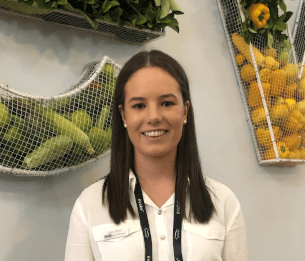
Networking success
By Jana Dixon
I’ve walked away from a jam-packed two days in Melbourne feeling inspired, tired, optimistic, confused, excited, eager, well-connected, and quite frankly feeling like I can change the world.
But once that bubble has burst and I fall back down from the inspiring cloud of ag-tech and innovation, I’m left with a feeling of: now what?
In the short term:
- I’ll follow up on the many connections I’ve made from the event. Networking, meeting new people and connecting with existing contacts would have to be an event highlight.
- I’ll look further into the many ag-tech start-ups, and technologies I have become aware of. In particular I’m keeping a keen eye on virtual fencing, on soil and plant sensing, data management platforms, robotic and AI weed management, and any technology that adds value to saleable products.
- I’ll review my notes, dwell on key messages and ponder the many unanswered questions, new ideas and concepts with colleagues, farmers and friends.
My key take home messages from the event:
- Machine learning and artificial intelligence will have a pivotal role in the future farming landscape, but how and when will it replace current practices? Virtual sensing for pests, disease and nutrition is an exciting space that I will continue to keep an eye on. I see the role of the agronomist becoming extremely important for ground truthing, interpreting and practically applying the technology.
- We have a long way to go before seeing a perfect world of data integration. I look forward to the day where there is greater integration of farm management platforms, but we need to get over a few hurdles such as regulating data ownership and IP before this is possible.
- Climate change: prevention and adaptation. More often than not we talk about the latter. evokeAG raised some really excellent discussion around the role the agriculture and food industry plays in reducing and capturing carbon from the atmosphere. There will need to be fundamental shifts in policy and attitude to ever make ‘regenerative agriculture’ a viable solution on a wide scale.

Robotics and apps
By Bryce Cronin
As an engineering student who has just begun my daunting final-year honours project in the field of robotics, it was incredible to see the high calibre of robotics and tech start-ups launching into the agriculture industry at the AWS ‘Start-up Alley’ exhibition.
Across the two days I managed to chat and network with many of the tech and robotics start-ups. Their products ranged from apps to reduce food wastage, to large automated robotic platforms designed to completely replace tractors. The one thing that I found consistent across these start-ups was that they were all incredibly ambitious.
There were a few of these start-ups that didn’t initially see themselves ever entering the agri-tech space – much like myself. I talked with one start-up who were originally creating low-cost microscopes for educational purposes. It was only when they discovered that the agriculture industry was buying up their product that they realised there was a market in other areas. They’re currently testing a smartphone app capable of recognising diseases in crops by taking photos using their microscope smartphone accessory.
The insights offered from these innovators, as well as my fellow scholarship recipients, has definitely impacted my plans for the future. I intend on continuing to explore the agri-tech space during and following my studies.
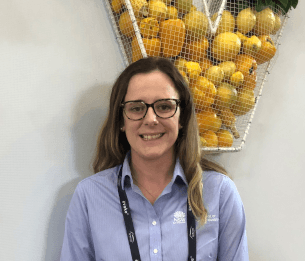
Sustainable future
This conference was like nothing I had experienced before. From eating v2 plant-based meat alternatives at lunch to experiencing virtual reality for the first time, the event showcased all aspects of technology and innovation in the agri-food sector.
I met some amazing people who shared the vision of collaborating to innovate in agri-tech and food production. The most interesting sessions for me were centred on sustainable practices, like sequestering carbon in soils, reducing agriculture’s contribution to climate change, and reducing food waste. I also enjoyed the discussion around how we are going to get young people from all areas of science into agriculture and keep them engaged and passionate about the production of high-quality safe food.
I got a lot out of meeting the other scholars as we are all from different careers and backgrounds. By attending this event my professional networks have expanded considerably.
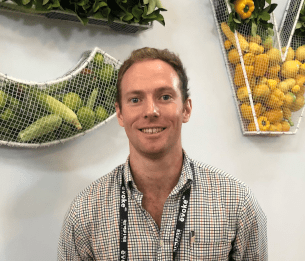
Collaboration is key
EvokeAG 2020 brought farmers, venture capitalists, scientists, entrepreneurs, agribusiness professionals and future industry leaders together all in the one place. Collaboration was a significant theme of the event, with many speakers noting that inter-disciplinary partnerships are essential to grow Australian agriculture to $100 billion and beyond by 2030.
Attendees were encouraged to collaborate with others in the ag-tech space and look beyond the Australian market place to grow their business, using Singapore as the gateway to Asia. Much of the tech on show in start-up alley was app-based, designed to increase on farm and post farm gate efficiencies.
Food wastage was highlighted as an increasing challenge, with $20 billion of food currently wasted in Australia, which is one third of the current farm gate value of agriculture per annum. Speakers raised the need for a more circular economy in Australia to reduce food waste and make both food production and the food economy in Australia more sustainable.
The need for greater water and fertiliser efficiency across Australia was also highlighted, with some start-ups promoting nano fertiliser technologies to increase efficiency whilst reducing environmental health concerns. As speakers at the event made clear, using tech to provide farmers with reliable, real time 4D digital view of soils as well as more automated irrigation systems in broadacre agriculture will certainly aid in better decision-making processes.
I’m looking forward to seeing what progress is made in the 12 months before evokeAG 2021 in Perth.
